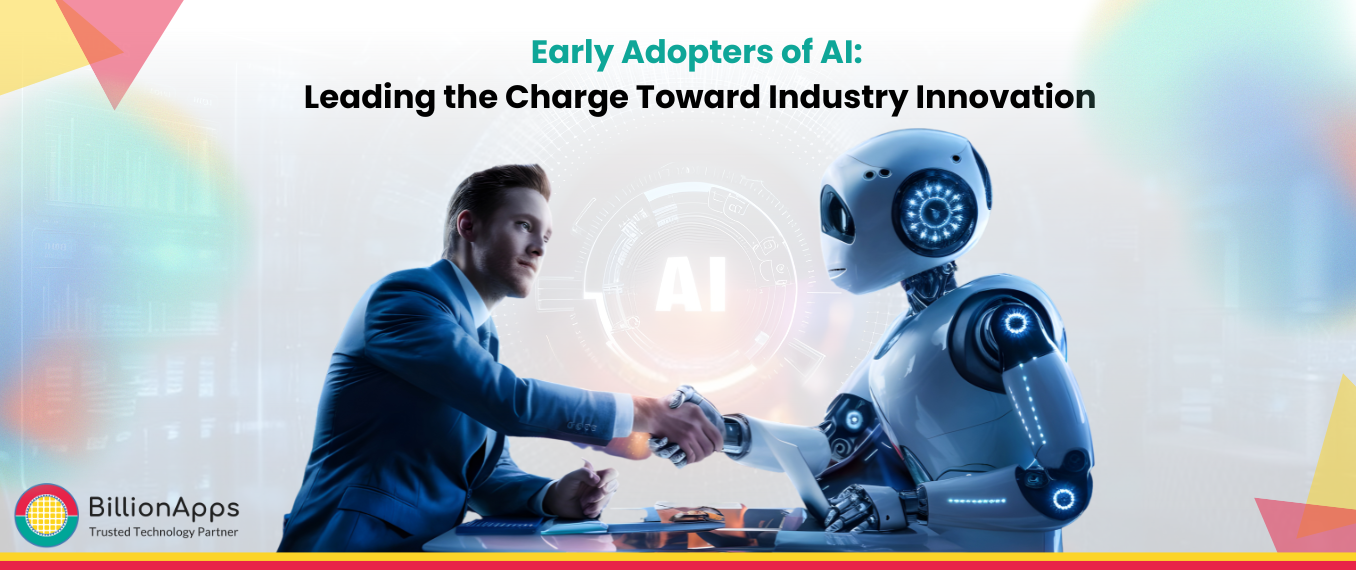
Introduction
Artificial intelligence (AI) is transforming industries, and businesses that adopt it early are gaining a significant competitive edge. With AI predicted to contribute up to $15.7 trillion to the global economy by 2030, companies are leveraging this technology to innovate and outperform their competitors.
Understanding AI and Its Potential
Artificial Intelligence (AI) involves machines performing tasks that typically require human intelligence, such as learning, reasoning, and problem-solving. Key forms of AI include machine learning, natural language processing, and robotics.
AI is already enhancing efficiency and productivity across various sectors. As the technology evolves, its potential to revolutionize industries becomes even more profound, offering businesses unprecedented opportunities for innovation.
The Strategic Advantage of Early Adoption
1. Innovation Leadership:
By integrating AI into their business processes, these companies demonstrate forward-thinking and a willingness to embrace new technologies. This leadership in innovation attracts top talent, investors, and customers who value cutting-edge solutions.
2. Market Differentiation:
AI enables companies to differentiate themselves from their competitors by offering unique products and services. For instance, personalized recommendations powered by AI can significantly enhance customer experience, setting a business apart in a crowded market.
3. Agility and Adaptability:
AI technology allows organizations to become more agile and responsive to market changes. Through predictive analytics and real-time data processing, companies can quickly adapt to shifting consumer demands, mitigate risks, and seize new opportunities.
Industries Leading the AI Revolution
Healthcare
In healthcare, AI is revolutionizing patient care and medical research. From personalized medicine to advanced diagnostics, AI systems are improving accuracy and efficiency. For example, AI algorithms can analyze medical images faster and more accurately than human radiologists, enabling early detection of diseases like cancer.
Finance
The finance industry is leveraging AI for tasks such as fraud detection, algorithmic trading, and customer service. AI-powered chatbots handle routine customer inquiries, freeing up human agents to tackle complex issues. Additionally, AI-driven algorithms can analyze vast amounts of data to identify fraudulent activities, enhancing security and trust.
Retail
In retail, AI is transforming how businesses interact with customers. AI systems analyze consumer behavior to provide personalized shopping experiences, optimize inventory management, and predict sales trends. Companies like Amazon use AI to power their recommendation engines, which significantly boost sales and customer engagement.
Manufacturing
AI is streamlining manufacturing processes through automation and quality control. AI-powered robots perform repetitive tasks with precision, reducing human error and increasing productivity. In addition, AI systems optimize supply chain operations, ensuring timely delivery and minimizing costs.
Transportation
The transportation industry is witnessing significant advancements due to AI, particularly in the development of autonomous vehicles. AI algorithms enable self-driving cars to navigate complex environments safely. Moreover, AI is optimizing logistics and fleet management, reducing operational costs and improving efficiency.
Case Studies of Successful Early Adopters
- Netflix: Uses AI for personalized content recommendations, boosting viewer engagement.
- IBM Watson: Provides AI solutions for healthcare, improving medical research and patient care.
Steps to Becoming an AI Early Adopter
Assessment
Businesses should assess their readiness for AI adoption by evaluating their current processes, technological infrastructure, and strategic goals. Understanding where AI can add value is crucial for successful integration.
Strategy Development
Developing a strategic plan for AI integration involves setting clear objectives, identifying key areas for AI implementation, and establishing a roadmap for deployment. This plan should align with the company’s long-term goals and consider potential risks and challenges.
Partnerships and Collaborations
Partnering with AI technology providers and industry experts can accelerate AI adoption. Collaborations provide access to specialized knowledge and resources, enabling businesses to implement AI solutions more effectively.
The Future of AI Adoption – Long-term Benefits
The long-term benefits of staying ahead with AI technologies include sustained competitive advantage, increased innovation capacity, and enhanced operational efficiency. Early adopters can leverage AI to drive growth and success in the digital age.
Conclusion
AI is a transformative force, and early adopters are gaining a competitive edge by leveraging its capabilities. Companies that invest in AI today position themselves for a prosperous future.
Let BillionApps be your partner in exploring AI solutions tailored to your industry. Start your journey as an AI early adopter and unlock new possibilities for your business. Contact us today!